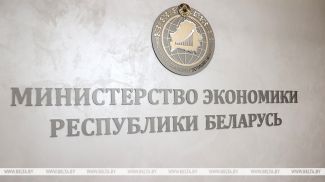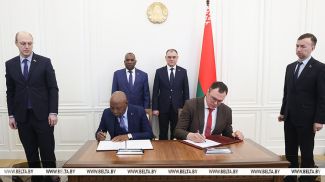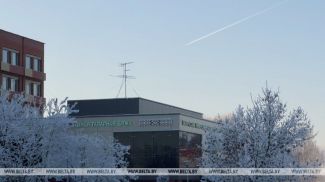
MINSK, 14 August (BelTA) – Today we will review the economic performance in the first half of 2024, Belarusian Economy Minister Yuri Chebotar told journalists ahead of a meeting of the Council of Ministers in Minsk on 14 August, BelTA has learned.
"Looking at the dynamics, we see that the Belarusian economy is on track for the main targets. Most importantly, we prioritize the qualitative growth, pay attention to the indicators that characterize the quality of life. First of all, this is inflation. Thanks to the measures that we have taken it is within the forecast parameters and clocked in at 3.4% in June over December. Thanks to this, real income growth is within 9%, the average salary has exceeded Br2,000," Yuri Chebotar said.
All this, among other things, supports the domestic demand. "Retail is growing. In particular, we see the growing popularity of loan products for domestic goods. Our domestic furniture and household appliances are very popular. I would like to once again draw the attention of our citizens to the fact that there is an opportunity to purchase domestic goods on credit," the minister said.
Investment activity is essential for the development of the real sector of the economy. "We are working with the regions and other ministries on initiatives regarding the investment projects. This domain is in continuous dynamics. The qualitative content of investments has changed: the share of investments in machinery and equipment, i.e. in the active part that improves competitiveness and labor productivity, has grown significantly," the minister informed.
"Export remains a key priority. As we planned, we have significantly boosted supplies to geographically distant countries. We have been working to keep the momentum," Yuri Chebotar noted.
When asked if the overheating of the economy is a concern for the government, he replied: "Together with our economic and development institutions, we are watching the so-called heat map of possible overheating of the economy according to classical parameters. Everything is within the normal range. We keep an eye on the parameters that are in the red zone, and together with regulators we make decisions. So we are not much concerned about this issue."
"Looking at the dynamics, we see that the Belarusian economy is on track for the main targets. Most importantly, we prioritize the qualitative growth, pay attention to the indicators that characterize the quality of life. First of all, this is inflation. Thanks to the measures that we have taken it is within the forecast parameters and clocked in at 3.4% in June over December. Thanks to this, real income growth is within 9%, the average salary has exceeded Br2,000," Yuri Chebotar said.
All this, among other things, supports the domestic demand. "Retail is growing. In particular, we see the growing popularity of loan products for domestic goods. Our domestic furniture and household appliances are very popular. I would like to once again draw the attention of our citizens to the fact that there is an opportunity to purchase domestic goods on credit," the minister said.
Investment activity is essential for the development of the real sector of the economy. "We are working with the regions and other ministries on initiatives regarding the investment projects. This domain is in continuous dynamics. The qualitative content of investments has changed: the share of investments in machinery and equipment, i.e. in the active part that improves competitiveness and labor productivity, has grown significantly," the minister informed.
"Export remains a key priority. As we planned, we have significantly boosted supplies to geographically distant countries. We have been working to keep the momentum," Yuri Chebotar noted.
When asked if the overheating of the economy is a concern for the government, he replied: "Together with our economic and development institutions, we are watching the so-called heat map of possible overheating of the economy according to classical parameters. Everything is within the normal range. We keep an eye on the parameters that are in the red zone, and together with regulators we make decisions. So we are not much concerned about this issue."













